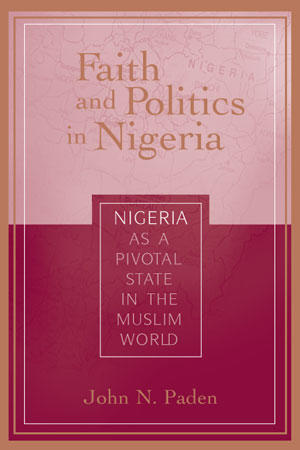Pivotal State Series
As the most populous country in Africa and a major oil producer, Nigeria has long been recognized as the dominant force in West Africa. But its standing within the broader international arena, especially its comparative position within the Muslim world, has been less well understood. Indeed, does Nigeria's influence extend beyond the region? In this concise volume, John N. Paden answers this very question, contending that Nigeria is globally significant for a multitude of reasons, not least of which for the political resiliency it has demonstrated despite its complex ethnolinguistic and religious diversity.
"Scholars and practitioners looking at the role of Islam and its political role tend to focus on the Middle East. John Paden provides a much needed focus on African experience. Paden, America’s foremost expert on Islam in Nigeria, provides an analysis of how Nigeria, with the world’s fifth largest Muslim population and at the same time an equally large Christian population, has mastered the task of keeping the country together and most recently managing a transition to elected democratic rule. . . . Paden delves into the formal and informal federalism arrangements, the role of religious leadership, and the understandings about power sharing that explain this success. But these arrangements are fragile and Paden provides sound recommendations for what Nigeria must do to preserve this coexistence. This is an outstanding contribution to our understanding of nation building."
—Princeton N. Lyman, Adjunct Senior Fellow, Council on Foreign Relations
As the most populous country in Africa and a major oil producer, Nigeria has long been recognized as the dominant force in West Africa, but its standing within the broader international arena, especially its comparative position within the Muslim world, has been less well understood. Indeed, does Nigeria's influence extend beyond the region.
In this concise volume, John N. Paden answers this very question, contending that Nigeria is globally significant for a multitude of reasons, not least of which for the political resiliency it has demonstrated despite its complex ethnolinguistic and religious diversity. He argues that Nigeria, with a population that is almost evenly divided between Muslims and Christians, could serve uniquely as a model for interreligious political accommodation and as a bridging actor in global politics between the West and the Muslim world. He concludes by calling on the United States to formulate better engagement strategies in the region and to support Nigeria’s political resilience by strengthening social, cultural, and economic ties, and by showing greater understanding and diplomatic tolerance toward the country.
Faith and Politics in Nigeria offers timely, clear, and astute analysis that will be valued by students and scholars of Islamic and African studies and provides keen recommendations for policymakers and conflict-management practitioners.
About the Author
John N. Paden is Clarence Robinson Professor of International Studies and Professor of Public and International Affairs at George Mason University. He has served as an international observer in three Nigerian presidential elections and is the author of numerous volumes, including, most recently, Muslim Civic Cultures and Conflict Resolution: The Challenge of Democratic Federalism in Nigeria.
